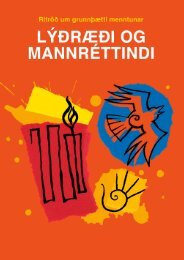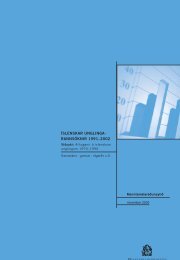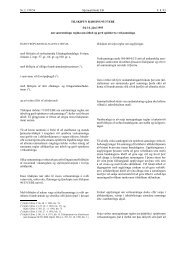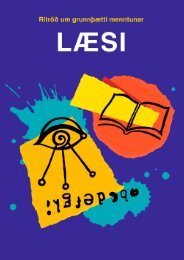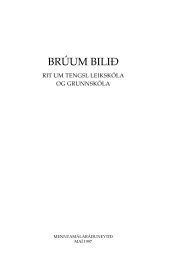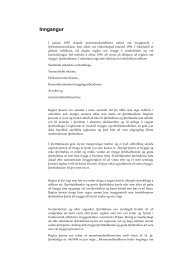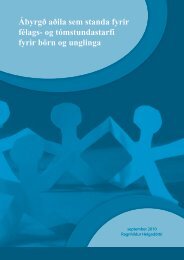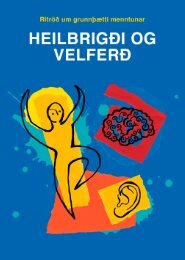Arts and Cultural Education in Iceland : Professor Anne Bamford
Arts and Cultural Education in Iceland : Professor Anne Bamford
Arts and Cultural Education in Iceland : Professor Anne Bamford
You also want an ePaper? Increase the reach of your titles
YUMPU automatically turns print PDFs into web optimized ePapers that Google loves.
<strong>and</strong> the teach<strong>in</strong>g. It is just not possible for them to do research as well. Many schools do<br />
activities but they do not consciously know the impact of their work. This seemed to be<br />
particularly the case <strong>in</strong> heritage education, where many schools <strong>and</strong> children were <strong>in</strong>itiat<strong>in</strong>g<br />
<strong>in</strong>terest<strong>in</strong>g <strong>in</strong>quiries <strong>in</strong> this field, but were not explicitly aware of the nature of their work.<br />
Allied to the lack of research, was the general lack of shar<strong>in</strong>g of good practice action models<br />
from one place to the next. This seemed to be the result both of geographical separation <strong>and</strong> of<br />
a lack of resources (time <strong>and</strong> money) to encourage shar<strong>in</strong>g. The lack of research was particularly<br />
evident <strong>in</strong> relation to a number of highly successful ‘ground-up’ <strong>in</strong>itiatives.<br />
For example, a festival with<strong>in</strong> a local community may have been highly successful, <strong>in</strong>novative<br />
<strong>and</strong> ground-break<strong>in</strong>g, but there would be no evidence gathered, research undertaken, or<br />
reflections made to ensure that learn<strong>in</strong>g from such successful experiences could be transferred<br />
to future events, or similar events <strong>in</strong> other locations. For example, the research team<br />
approached a cultural officer <strong>in</strong> the town where they host one of Icel<strong>and</strong>'s ma<strong>in</strong> cultural festivals<br />
<strong>and</strong> asked him if the economic impact of culture or the cultural festival had been studied. He<br />
said that there had been talk of do<strong>in</strong>g this but noth<strong>in</strong>g had yet been done. There is a lack of<br />
impact research conducted around these local <strong>in</strong>itiatives. No one knows how much additional<br />
<strong>in</strong>come is generated, what the value is to the community. It is very difficult to get national media<br />
coverage. Publicity is done onl<strong>in</strong>e, but there is a lack of jo<strong>in</strong>ed up th<strong>in</strong>k<strong>in</strong>g. Concurrently,<br />
practitioners work<strong>in</strong>g <strong>in</strong> the tertiary sector were more likely to take their expertise abroad, that<br />
to other parts of Icel<strong>and</strong>.<br />
Teachers were also keen to undertake further research study <strong>in</strong>to their work, <strong>in</strong> the form of<br />
action research, but with the exception of a relatively small sabbatical programme, there were<br />
limited opportunities for research-based study <strong>in</strong> the arts (especially part-time offers that could<br />
be undertaken concurrently with their jobs as teachers <strong>and</strong> cultural workers). Those work<strong>in</strong>g<br />
with further <strong>and</strong> higher education are aware of the need to build a more vibrant research milieu<br />
<strong>in</strong> the arts, design <strong>and</strong> cultural fields <strong>in</strong> Icel<strong>and</strong> <strong>and</strong> plans are underway to enhance the offer<strong>in</strong>gs<br />
<strong>in</strong> these fields.<br />
Quality arts programmes encourage people to take risks <strong>and</strong> allow them to make mistakes.<br />
'Lett<strong>in</strong>g go' of control <strong>and</strong> be<strong>in</strong>g confident to make mistakes is an important part of the creative<br />
process. Uncerta<strong>in</strong>ty surrounds quality arts practice <strong>and</strong> this is to be encouraged.<br />
With<strong>in</strong> Icel<strong>and</strong> there were good practice examples of projects that encouraged exploration<br />
<strong>and</strong> challenged pupils, teachers <strong>and</strong> artists to go beyond their perceived scope <strong>and</strong> ability. These<br />
were particularly evident <strong>in</strong> more remote communities where <strong>in</strong>novation <strong>and</strong> community<br />
<strong>in</strong>ventiveness had led to particularly <strong>in</strong>terest<strong>in</strong>g practices <strong>in</strong> the arts.<br />
Ironically, many of the more established cultural <strong>in</strong>stitutions – <strong>in</strong>clud<strong>in</strong>g some music schools<br />
– tended to favour highly traditional approaches to arts education. In these <strong>in</strong>stances, the<br />
programmes promoted ongo<strong>in</strong>g practices <strong>and</strong> traditions rather then <strong>in</strong>novation <strong>and</strong> risk tak<strong>in</strong>g.<br />
In some cases, the re<strong>in</strong>forcement of tradition was enshr<strong>in</strong>ed <strong>in</strong> their <strong>in</strong>stitutional culture. For<br />
example, <strong>in</strong> one music school there was a clear m<strong>and</strong>ate to work <strong>in</strong> a traditional manner <strong>in</strong><br />
private lessons <strong>and</strong> to follow time-honoured practices. This had led to a number of teenagers<br />
establish<strong>in</strong>g alternative pathways <strong>in</strong> music, <strong>and</strong> as the schools openly stated, “If they don’t like<br />
the way we do th<strong>in</strong>gs here, there are other (private) music schools where pupils can do more<br />
experimental work.” Primarily, the more traditional sectors receive the majority of fund<strong>in</strong>g <strong>and</strong><br />
the discussion should be begun <strong>in</strong> Icel<strong>and</strong> as to the relative methods of more traditional<br />
approaches or more <strong>in</strong>novative practices. In particular, it could be argued that the after school<br />
72



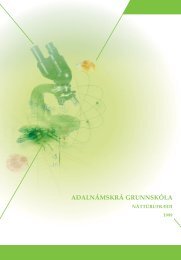
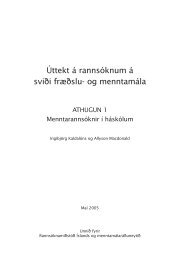
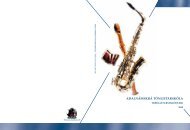
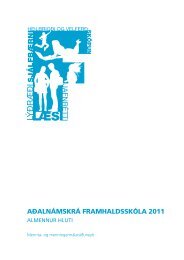
![Aðalnámskrá tónlistarskóla : rytmÃsk tónlist [Eingöngu á rafrænu formi]](https://img.yumpu.com/50843672/1/184x260/aaalnamskra-tanlistarskala-rytma-sk-tanlist-eingangu-a-rafranu-formi.jpg?quality=85)
